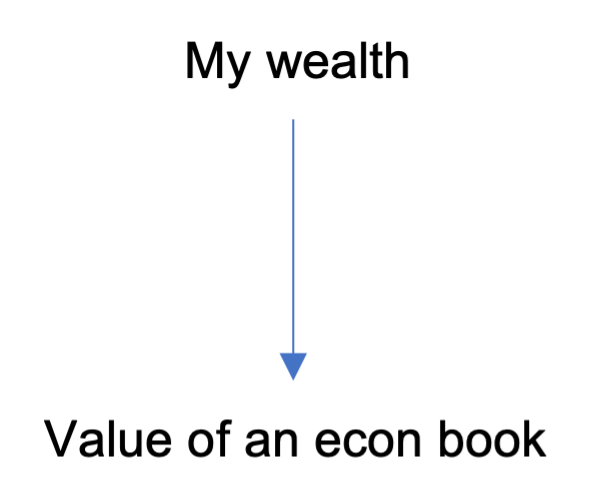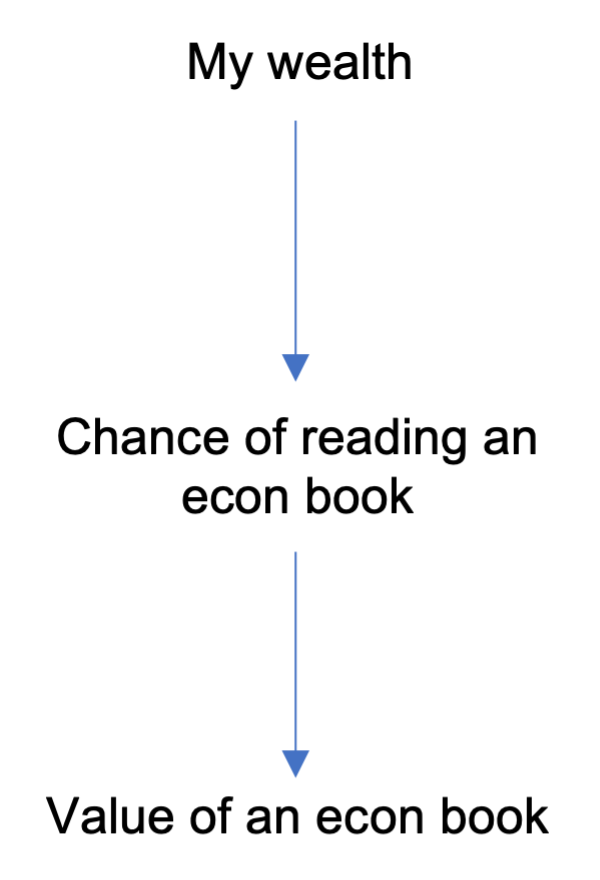Meaning of Words - An Exercise for Active Thinking
post by aysajan · 2022-01-31T20:18:38.040Z · LW · GW · 0 commentsContents
An example of fancy math jargon Finding holes in the argument Why not just Google search, or keep reading? Final Note None No comments
An example of fancy math jargon
What comes to your mind when you first hear the phrase “abstract nonsense”? For me, the first picture in my head was some obvious falsehood, like 1+1=3. I was not so sure about the “abstract” part, thinking it might not be something as concrete as 1+1=3. So I decided to look it up and here was what I found (from Wikipedia):
“In mathematics, abstract nonsense, general abstract nonsense, generalized abstract nonsense, and general nonsense are terms used by mathematicians to describe abstract methods related to category theory and homological algebra.”
What a surprise! Not being a mathematician, I found this explanation not very helpful. But before looking any further, I decided to do some guessing about what category theory and homological algebra refer to. First, what might be category theory? For instance, in mathematics we have different categories of numbers, such as natural numbers, real numbers, complex numbers, etc. But why and how are these different number categories created? Maybe category theory refers to the study of such categorizations. For homological algebra, I pictured two things in my head. First is homo, which usually means “the same thing/category”. Next is logical, which usually is “some kind of reasonable argument”. For instance, if A>5 and B>7, then we can derive A+B>12 by logic. Since homological algebra is placed together with category theory, I guessed that they were related to each other in some way.
I might be completely wrong with those pictures in my head (Indeed I was wrong for the most part, except the close connection between category theory and homological algebra), but the point is the active thinking process. The focus is an exercise where, when we come across some unknown/unfamiliar statements/claims, we try to build a picture. Now the question is: Why might this try-to-build-up-a-picture-in-my-head thing be useful? While I try to build up a picture in my head, I am actually actively thinking, instead of looking for answers externally right away. In this process, I dig into my brain and look for examples to interpret what I am reading. It also might illuminate new insights that haven’t been considered by the writer. This happens when the picture in my head turns out to be very different from what the author intends to present. Another benefit of this exercise is that it might help identify holes in an argument. Below is such an example.
Finding holes in the argument
Several days ago, I was trying to create a causal graph for the value of an econ book and an interesting point came up from my discussion on the graph with John [LW · GW]. In my causal graph, I had a relationship like this:

The argument is that if I couldn’t afford the econ book, its value would be zero to me. John disagreed, using an example of a yacht. He can’t afford a yacht, but this fact does not prevent him from partying on a yacht with his friends. In other words, he can still obtain value from a yacht, despite not owning one.
Why is this disagreement worth looking into in depth? In the context of the econ book, I am picturing a scenario where I can’t afford an econ book and as a result, I can’t get any value out of it. Thus, my interpretation for the value of an econ book (at least partially) is that it is the value of my actually reading the econ book. But from John’s point of view, the graph is referring to the value of the econ book, taking as a given that he had an opportunity to read it.
Depending on the kind of picture I build up in my head, I have different interpretations. In a broader sense, when words are used in different places, the interpretations might be different. Why? Because I try to build a picture in my head when I read something, and interpret it accordingly. For the value-of-an-econ-book example, I was building up this picture in my head: I couldn’t afford this econ book, and as a result the book seemed to have zero value to me. On the other hand, John pictured something different: he was partying with his friends on a rented yacht. He does not need to own the yacht to have fun with friends and get value out of it.
How did I benefit from this little “discovery”? I revised the causal structure by adding a new node “Chance of reading an econ book”. Now, the argument reads like this: My wealth will affect my chance of reading the econ book. If I have (enough) money to buy the book, my chance of reading the econ book is higher than in the case where I can’t afford the book. Of course, buying the book does not guarantee I will actually read the book, so it is not deterministic. The point is by differentiating two different pictures of value, I was able to improvise my causal graph.

Let me walk through another exercise and record my thought process. Here is the first paragraph of the book “The Book of Why” byJude Pearl and Dana Mackenzie (you can try this exercise with the abstract of a randomly selected scientific article):
“This book tells the story of a science that has changed the way we distinguish facts from fiction and yet has remained under the radar of the general public. The consequences of the new science are already impacting crucial facets of our lives and have the potential to affect more, from the development of new drugs to the control of economic policies, from education and robotics to gun control and global warming. Remarkably, despite the diversity and apparent incommensurability of these problem areas, the new science embraces them all under a unified framework that was practically nonexistent two decades ago.”
Now let me walk through the exercise with this paragraph. The goal is to build up a picture in my head after reading each sentence (Of course, you don’t need to build a picture for every sentence of a text, but only for the ones that you think might be worth pausing and building a picture before moving on).
- “This book tells the story of a science that has changed the way we distinguish facts from fiction and yet has remained under the radar of the general public.” Facts are real but fiction is not. Fiction is imagined stories. If someone told me that he made a million dollars in crypto last year, I would not be so sure if that is a fact or not. So it is very likely that I will ask a series of questions to verify the truthfulness of his claim. For instance, what did he invest in? When did he start investing? How much did he invest initially? The answers to those questions help me verify if he indeed made a million dollars. Here I am picturing some method of distinguishing facts from fiction.
- “The consequences of the new science are already impacting crucial facets of our lives and have the potential to affect more, from the development of new drugs to the control of economic policies, from education and robotics to gun control and global warming. ” What could this new science be? Do we already have something similar in our life? One common feature of all these problems is complexity. Each problem listed here involves many factors. For instance, for the development of new drugs, I am picturing expensive up-front costs, many clinical trials, multi-stage processes, embedded decisions, and more failures than successes. Economic policies tend to involve many factors as well. For such problems, one potential science that I can think of is the decision theory. I can use a decision tree to map out a sequence of events, separate decisions from random events, and evaluate different outcomes systematically. That leads to a question I have: How is this new science compared to decision theory?
- “Remarkably, despite the diversity and apparent incommensurability of these problem areas, the new science embraces them all under a unified framework that was practically nonexistent two decades ago.” Exactly as I suspected, the problems involved are very diverse and very different. For instance, gun control problems have very different problem structures from robotics or global warming. As a result, the framework used for development of new drugs can’t simply extend to the control of economic policies or education. But I suppose the new science laid out in this book will be able to provide a unified framework for a wide variety of problems from different fields.
After building up some pictures in my head about the first paragraph of this book (in some sense, a high level of summary), I expect some kind of framework of tackling complex problems, each with a very different nature. This framework has wide applicability, and I can’t wait to try it out.
Why not just Google search, or keep reading?
One common practice I have is that when I am not clear about something in a text, I open Google or I keep reading, hoping that it will be clarified in later sections. Unfortunately, this process does not involve any active thinking. Building a picture in my head helps me connect with or extend what I already know. This process itself is an active way of thinking, instead of passively receiving from external sources.
Trying to build up a picture in my head also helps to explore different angles of a problem and discover useful insights, which was exactly what happened with that econ book example.
Final Note
This was something that came up in one of my discussion sessions with John. I felt like it was useful from at least two perspectives:
- It motivates writers to be as clear and precise as possible when explaining things.
- It motivates readers to actively think and build up a picture based on their experience/understanding/knowledge. This active thinking process might be useful to gain insights and discover some previously unfounded angles of a problem.
I have tried this approach in several sessions in this past week and really felt its usefulness. But apparently, I need more exercises to identify advantages and disadvantages of this approach and plan to write another post after experimenting with enough sessions. In the meantime, I welcome any feedback from readers.
Thanks to Justis and the LW feedback service [LW · GW] for feedback on an earlier draft.
0 comments
Comments sorted by top scores.